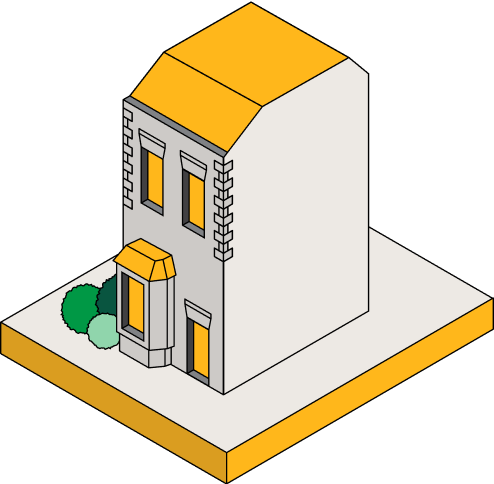
As far as succeeding in the property market goes, there are several routes towards achieving that goal. Whether you’re drawn to strategically investing in a certain location or a hands-on development project, both can potentially reap lucrative rewards. That said, it’s important to understand the differences between being a property investor and a developer, as this could shape how you approach your portfolio’s future.
HMO Architects work with numerous developers and investors and help them make informed decisions regarding their financial future. We help them navigate the complexities of HMO conversions, licensing, and planning permission with a range of useful guides on where, when, and how to invest.
When it comes to defining developers and investors, this guide breaks the two roles down into bite-sized chunks to make it easier to understand which is the right path for you.
What is a Property Developer?
Property developers come from all walks of life. Their main mission objective is to build new properties or redevelop existing ones to sell or rent for a profit.
They are primarily responsible for identifying strategic opportunities and delivering finished projects to the market. In the HMO sector specifically, developers may, for example, buy a dilapidated Victorian property and convert it into several apartments to rent. The developer would manage every aspect from the initial planning permission applications through to the placement of tenants.
What Does a Property Developer Do?
Project Management
Developers coordinate multiple moving parts in a property’s purchase, conversion, and resale. Developers liaise with architects, contractors, authorities and building control officers, to name a few. In an HMO development, this can often involve complex planning considerations around fire safety, room sizes, insulation, heating, running water, and more.
Financial and Risk Management
Property developers maintain oversight and control over budgets, cash flow and other financial decisions. They must be mindful of costs, market fluctuations and evolving regulations that could affect the profitability of their upfront investment. This is why it’s pivotal to develop an investor mindset when balancing multiple variables.
Compliance
Ideally, HMO developers should have a rounded understanding of building regulations, licensing, and planning requirements. They must comply with relevant industry standards, from fire safety and electricity to renewable energy requirements. For example, if a developer intends to install solar panels on a redevelopment site, it’s important to consult Health and Safety Advisors at the pre-design phase. The specialists at Universal Safety Practitioners explain, “safe and well-managed projects invariably start well, which is due majorly to setting good health and safety standards at the beginning of the project.”
Market Analysis
Successful HMO property developers will have researched local rental markets, identified profitable opportunities, and invested time into ensuring their project can yield a positive return. This involves an understanding of demographic trends, unique selling points like proximity to transport links, parking, or outside spaces, and other important housing policies.
Benefits of Being a Property Developer
Successful HMO developments can:
- Increase property values
- Generate positive rental yields
- Give developers complete control over factors like timelines and project quality
That said, development requires substantial upfront capital, an abundance of time and resources, and a profound knowledge of the wider market. The learning curve can be steep and property development mistakes can be costly.
What is a Property Investor?
Property investors take a slightly different approach, focusing on deploying a lump sum of capital and taking a less hands-on role. Property investors don’t necessarily need the trade skills or market knowledge to develop properties that developers do; they instead provide the funding for projects, often partnering with individual developers or firms. Investors, in other words, don’t get involved in the day-to-day running of property projects, and instead provide the capital and either generate a fixed-income return or claim dividends from developments.
What Does a Property Investor Do?
Due Diligence
Investors must thoroughly evaluate potential opportunities, examining market conditions, developer reputation, and projected returns. This requires undertaking relevant due diligence checks, calculating financial projections, conducting risk assessments, and presenting viable exit strategies should things go awry. Athi Law, a well-respected team of legal experts, defines key due diligence tasks as “the detailed examination of a property before purchase [which] includes reviewing legal documents, inspecting the property, and analysing its market value.”
Diversify Portfolios
Successful property investors involve themselves in multiple projects, locations, or investment types. For instance, they might invest in several HMO developments simultaneously whilst maintaining exposure to other property sectors.
Strategic Planning
Investors develop long-term strategies aligned with their long-term financial goals, risk tolerance, and timeline constraints, if relevant. Winning property investment strategies often involve the careful balancing act of generating enough income while sustainably growing your investment platform.
Manage Relationships
Building strong relationships with developers, fund managers, and industry professionals is crucial for investors to continuously access quality opportunities and receive preferential terms, including repayments and the possibility of devaluation should the market be unexpectedly disrupted.
Benefits of Being a Property Investor
Investment offers accessibility for those lacking manual trade skills like carpentry, electrics, plumbing or building, whilst still providing exposure to property market growth. Over half of UK property investors have begun expanding their portfolios in recent weeks, according to BuyAssociation. Investors can participate in multiple projects simultaneously without the time commitment required for hands-on development. The investor route also offers potentially lucrative liquidity options and reduced operational stress compared to development.
That said, investment requires access to capital, which may be at risk, considering there is never a guarantee of generating a return.
Where HMO Developers and Investors Overlap: Joint Ventures
The most successful property professionals often blur the lines between development and investment. Joint ventures allow investors to partner with experienced developers, combining their capital with a professional who can manage day-to-day duties with confidence and reassurance.
Many HMO projects benefit from this collaborative approach. Investors provide funding whilst developers contribute knowledge, resources, and project management capabilities, with timelines and calculations defined well ahead of time. These partnerships can access larger opportunities than either party might tackle independently.
Choosing Which HMO Investment Path is Right for You
Your choice between development and investment depends on several factors:
- Availability: Developers must be willing to be involved on an ongoing basis, while investors sit in the background.
- Risk tolerance: Developers face more possible short-term complications and variables, while investors’ decisions have far-reaching implications.
- Capital position: Investment isn’t guaranteed to garner returns, and development, while it requires larger commitments, can yield a higher ROI.
- Knowledge: Investors are more financially savvy and market-aware, while developers understand the intricacies and nuances of property, regulations, and construction.
Summary: Key Takeaways for HMO Investors or Developers
- Property developers take hands-on approaches, managing projects from conception to completion with higher potential returns but greater time commitment and risk
- Property investors focus on capital deployment and strategic analysis, offering more passive involvement with typically more predictable returns
- Joint ventures combine the strengths of both approaches, allowing investors and developers to collaborate for mutual benefit
- Success in either role requires thorough market knowledge, financial planning, and understanding of HMO-specific regulations and opportunities
- The choice between development and investment should align with your available time, capital, risk tolerance, and existing expertise
Ready to Start Your HMO Journey?
Whether you’re a developer or an investor, getting the right guidance early on is key. Book your HMO strategy call today and get tailored advice on where to invest and which developments offer the strongest returns Our expert team will help you assess your project’s potential and map out the next steps with confidence.
Ryan Windsor, Development Director and co-founder of HMO Architect, brings over 15 years of specialised experience in HMO development to the table. Having consulted on nearly 2,200 projects, Ryan is a highly seasoned HMO landlord with a vast and influential property network. He began his real estate journey at just 17, rapidly amassing a wealth of experience that sets him apart in the industry. Beyond his professional successes, Ryan is passionately dedicated to giving back, leading numerous charitable initiatives that make a meaningful impact on local communities.




